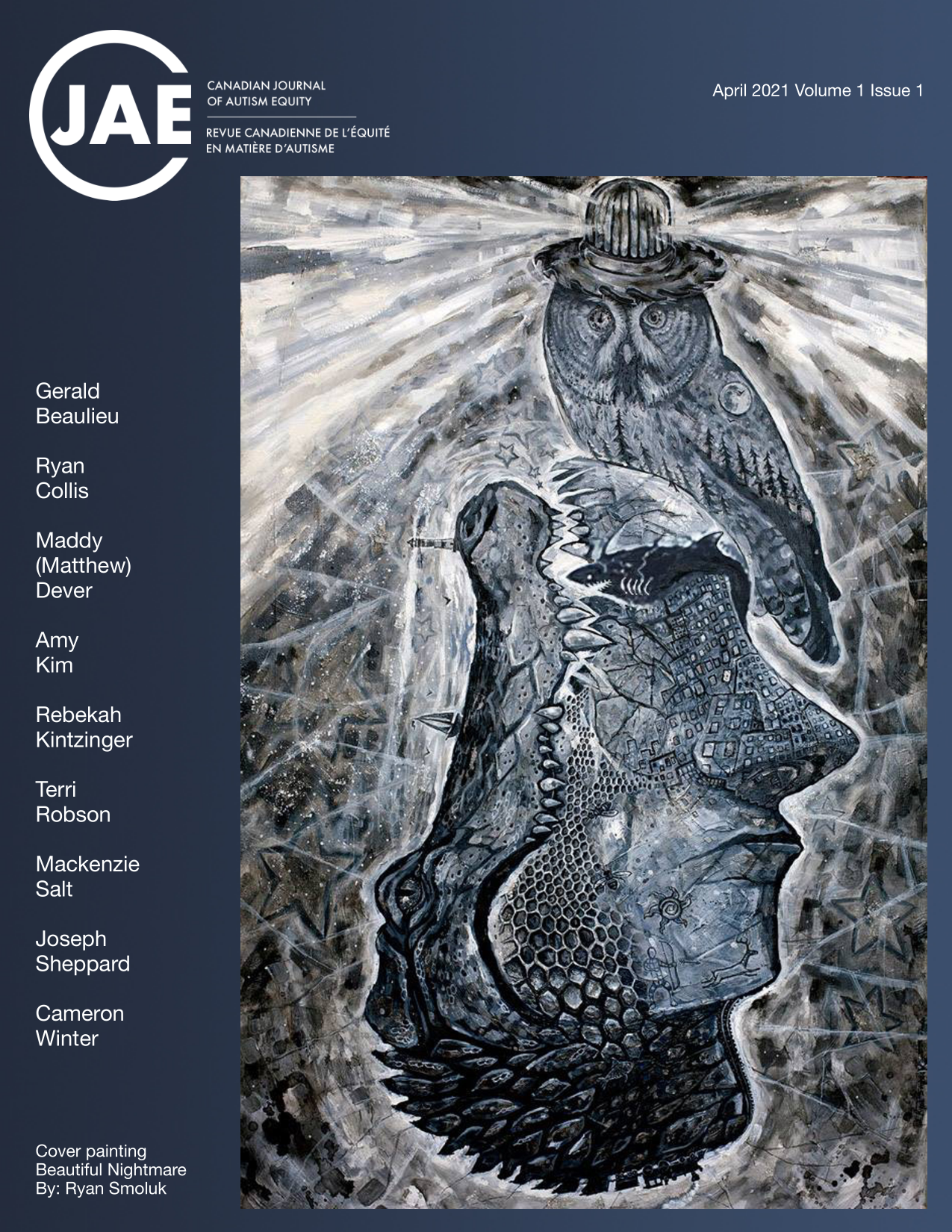Over and Over and Over: A Continued Call for Autistic Voices
DOI:
https://doi.org/10.15173/cjae.v1i1.4984Keywords:
Representation, PolicyAbstract
As an Autistic student in a master’s degree, I focused on the way expertise is understood. I was specifically interested in how policy decisions in education were made without Autistic involvement. I looked at the literature that was used to make these decisions and interviewed Autistic people as to their thoughts on who should be considered experts when it comes to autism. I found that policy was driven by experts who had little to no direct experience with autism or Autistics and who had no personal connections to the approaches they recommended. I argue that Autistic people must be involved in research design, execution, implementation, dissemination, and policy decisions.
References
Bottema-Beutel, K., Crowley, S., Sandbank, M., & Woynaroski, T. G. (2021). Research Review: Conflicts of Interest (COIs) in autism early intervention research – a meta-analysis of COI influences on intervention effects. Journal of Child Psychology and Psychiatry, 62(1), 5–15. https://doi.org/10.1111/jcpp.13249
Callon, M. (1986). Some Elements of a Sociology of Translation: Domestication of the scallops and the fishermen of St Brieuc Bay. In J. Law (Ed.), Power, Action and Belief. Routledge.
Collins, H. (2014). Are we all scientific experts now? Polity. Collins, H., & Evans, R. (2002). The Third Wave of Science Studies: Studies of Expertise and Experience. Social Studies of Science, 32(2), 235–296. https://doi.org/10.1177/0306312702032002003
Collis, R. (2019). Negotiating the Meaning of ‘Evidence Based’ Autistic Programming [Undergraduate Thesis, York University]. https://www.mrcollis.ca/research/negotiating-the-meaning-of-evidence-basedautistic-programming
Dawson, M., & Fletcher-Watson, S. (2021). Commentary: What conflicts of interest tell us about autism intervention research—a commentary on Bottema-Beutel et al. (2020). Journal of Child Psychology and Psychiatry, 62(1), 16–18. https://doi.org/10.1111/jcpp.13315
Epstein, S. (1995). The Construction of Lay Expertise: AIDS Activism and the Forging of Credibility in the Reform of Clinical Trials. Science, Technology, & Human Values, 20(4), 408–437. https://doi.org/10.1177/016224399502000402
Government of Ontario. (2007). Policy/Program Memorandum No. 140. Ontario Ministry of Education. http://www.edu.gov.on.ca/extra/eng/ppm/140.html#1
Kohn, A. (2020, January 29). Autism and Behaviorism: New Research Adds to an Already Compelling Case Against ABA. National Education Policy Center. https://nepc.colorado.edu/blog/autism-andbehaviorism
Kupferstein, H. (2018). Evidence of increased PTSD symptoms in autistics exposed to applied behavior analysis. Advances in Autism, 4(1), 19–29. https://doi.org/10.1108/AIA-08-2017-0016
McGuinty Government Helping Students With Autism Reach Their Full Potential. (2006, September 20). Ontario Newsroom. https://news.ontario.ca/archive/en/2006/09/20/McGuinty-Government-Helping-Students-With-Autism-Reach-Their-Full-Potential.html
Milton, D. (2014). Autistic expertise: A critical reflection on the production of knowledge in autism studies. Autism, 18(7), 794–802. https://doi.org/10.1177/1362361314525281
Milton, D., Mills, R., & Pellicano, E. (2014). Ethics and Autism: Where is the Autistic Voice? Commentary on Post et al. Journal of Autism & Developmental Disorders, 44(10), 2650–2651. https://doi.org/10.1007/s10803-012-1739-x
Ministers’ Autism Spectrum Disorders Reference Group. (2007). Making a Difference for Students with Autism Spectrum Disorders in Ontario Schools. Queen’s Printer for Ontario.
Nicolaidis, C., Raymaker, D., Kapp, S. K., Baggs, A., Ashkenazy, E., McDonald, K., Weiner, M., Maslak, J., Hunter, M., & Joyce, A. (2019). The AASPIRE practice-based guidelines for the inclusion of autistic adults in research as co-researchers and study participants. Autism, 23(8), 2007–2019. https://doi.org/10.1177/1362361319830523
Perry, A., & Condillac, R. (2003). Evidence-Based Practices for Children and Adolescents With Autism Spectrum Disorders: Review of the Literature and Practice Guide. Children’s Mental Health Ontario.
Rodgers, M., Marshall, D., Simmonds, M., Le Couteur, A., Biswas, M., K, W., D, R., S, P., & R, S. L. & H. (2020). Interventions based on early intensive applied behaviour analysis for autistic children: A systematic review and cost-effectiveness analysis. Health Technology Assessment, 24(35). https://doi.org/10.3310/hta24350
Sandbank, M., Bottema-Beutel, K., Crowley, S., Cassidy, M., Dunham, K., Feldman, J. I., Crank, J., Albarran, S. A., Raj, S., Mahbub, P., & Woynaroski, T. G. (2020).
Project AIM: Autism intervention meta-analysis for studies of young children. Psychological Bulletin, 146(1), 1–29. http://dx.doi.org.ezproxy.library.yorku.ca/10.1037/bul0000215
Sandoval-Norton, A. H., & Shkedy, G. (2019). How much compliance is too much compliance: Is long-term ABA therapy abuse? Cogent Psychology, 6(1), 1641258. https://doi.org/10.1080/23311908.2019.1641258
Shea V. (2005). A Perspective on the Research Literature Related to Early Intensive Behavioral Intervention (Lovaas) for Young Children with Autism. Communication Disorders Quarterly, 26(2), 102–111.
The Department of Defense Comprehensive Autism Care Demonstration Annual Report. (2019). [Report to the Committees on Armed Services of the Senate and House of Representatives]. http://health.mil/Reference-Center/Congressional-Testimonies/2019/06/10/Annual-Report-on-Autism-Care-Demonstration-Program
The Department of Defense Comprehensive Autism Care Demonstration Annual Report. (2020). [Report to the Committees on Armed Services of the Senate and House of Representatives]. https://therapistndc.org/wp-content/uploads/2020/08/Annual-Report-on-Autism-Care-Demonstration-Program-for-FY-2020.pdf
Wilkenfeld, D. A., & McCarthy, A. M. (2020). Ethical Concerns with Applied Behavior Analysis for Autism Spectrum “Disorder.” Kennedy Institute of Ethics Journal, 30(1), 31–69.
Downloads
Published
How to Cite
Issue
Section
License
Copyright (c) 2021 Ryan Collis

This work is licensed under a Creative Commons Attribution-NonCommercial-ShareAlike 4.0 International License.
Authors retain copyright and grant the journal the right of first publication with the work simultaneously licensed under a Creative Commons Attribution License that allows others to share the work with an acknowledgement of the work's authorship and initial publication in this journal.
Authors are able to enter into separate, additional contractual arrangements for the non-exclusive distribution of the journal's published version of the work (e.g., post it to an institutional repository or publish it in a book), with an acknowledgement of its initial publication in this journal.
CJAE accepts articles that have not been published in any other journals/proceedings, unless copyright permission is assured, and have not been submitted for consideration to any other journals/proceedings at the time of submitting to the Canadian Journal of Autism Equity for consideration. While a paper is under consideration by CJAE, you agree not to submit the work to other journals/proceedings until review by CJAE is completed and a decision has been rendered.



